by Manlio Dinucci *
Manlio Dinucci returns on items noted in our columns at the outset of the war in Libya: colonial "volunteer"powers have taken over the huge state investments made by Libya abroad. The money frozen in Western banks threatened the monopoly of the World Bank and IMF in financing development projects in the Third World. It continues to "work" (no more in the form of investment but now of bank guarantees), this time in favor of Westerners.
 |
| Libyan Central Bank |
The objective of the war in Libya is not just oil, whose reserves (estimated at 60 billion barrels) are the largest in Africa and extraction costs among the lowest in the world, nor the natural gas reserves which are estimated at about 1 500 billion m3. In the viewfinder of the volunteers' Libyan operation there are sovereign wealth funds, money that the state of Libya has invested abroad.
Sovereign wealth funds managed by the Libyan Investment Authority (LIA) is estimated at approximately $ 70 billion, climbing to over 150 if you include foreign investments of the Central Bank and other agencies. And they could be even greater. Even if they are lower than those of Saudi Arabia or Kuwait, Libyan sovereign funds are characterized by their rapid growth. When the LIA was established in 2006, it had 40 billion. In five short years, she has made investments in over one hundred companies in North African, Asian, European, North American and South American: holding, banking, real estate, industry, oil companies and others.
Italy's principal investments are those made in Libyan UniCredit Banca (including Lia and the Central Bank of Libya have 7.5%) in Finmeccanica (2%) and Eni (1%): These investments and others (including 7, 5% Juventus Football Club) have less economic significance (they amount to about $ 4 billion) than politics.
Libya, after Washington had removed it from its proscription list of "rogue states", tried to rebuild a place at the international level by focusing on the "diplomacy of SWFs”. When the United States and the European Union lifted the embargo of 2004 and the major oil companies returned to the country, Tripoli was able to have a trade surplus of about $ 30 billion annually largely allocated to foreign investment. The management of SWFs but created a new mechanism of power and corruption at the hands of ministers and senior officials, which probably escaped the control of Qaddafi himself confirmed by the fact that in 2009, he proposed than 30 billion oil dividends go "directly to the Libyan people." This has accentuated the fractures inside the Libyan government.
It is on these fractures that the U.S. and European ruling circles have put pressure, circles who, before the military attack on Libya to take over its energy wealth, have taken over the Libyan sovereign wealth funds. This operation was supported by the very representative of the Libyan Investment Authority, Mohamed Layas: as revealed in a diplomatic cable published by Wikileaks, on January 20 Layas informed the U.S. ambassador in Tripoli that the LIA had filed $ 32 billion in U.S. banks. Five weeks later, on February 28, the U.S. Treasury had "frozen" the assets. According to official statements, is "the largest sum of money ever blocked in the U.S.,", money that Washington keeps "in trust for the future of Libya." It could actually be an injection of capital into the ever more indebted U.S. economy. A few days later, the EU had "frozen" around 45 billion euros of Libyan funds.
The attack on Libyan funds will have a particularly strong impact on Africa. Here, the Libyan Arab African Investment Company has made investments in over 25 countries, including 22 in sub-Saharan Africa, while scheduling to increase investments in the next five years, especially in mining, manufacturing, tourism and telecommunications. Libyan investments have been decisive in achieving the first telecommunications satellite from the Rascom (Regional African Satellite Communications Organization), which went into orbit in August 2010, and allows African countries to begin to become independent of U.S. and European satellite networks, thus achieving annual savings of hundreds of millions of dollars.
Even more important were the Libyan investments in realising the three financial institutions launched by the African Union: African Investment Bank, headquartered in Tripoli, the African Monetary Fund, based in Yaoundé (Cameroon); Bank Central Africa, based in Abuja (Nigeria). The development of these bodies would enable African countries to escape the control of the World Bank and International Monetary Fund, both instruments of neo-colonial domination, and would mark the end of the CFA franc, the currency that 14 former French colonies are obliged to use. The freezing of Libyan funds dealt a heavy blow to the whole project. The weapons used by the "volunteers" are not only those of the Libyan military operation.
(Translated from French)
Original article : http://www.voltairenet.org/article169542.html
by Manlio Dinucci
Geographer and geo-political scientist.
